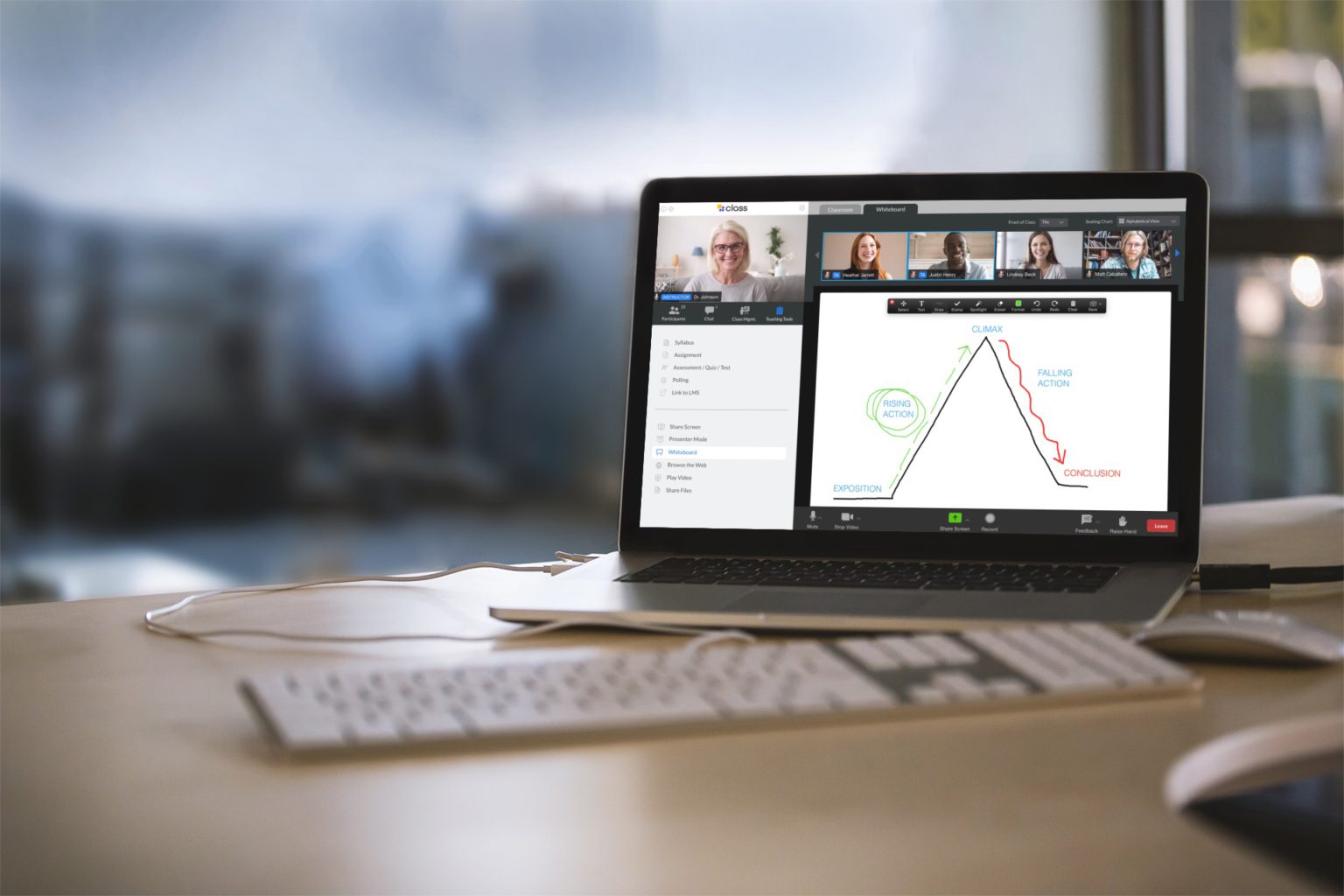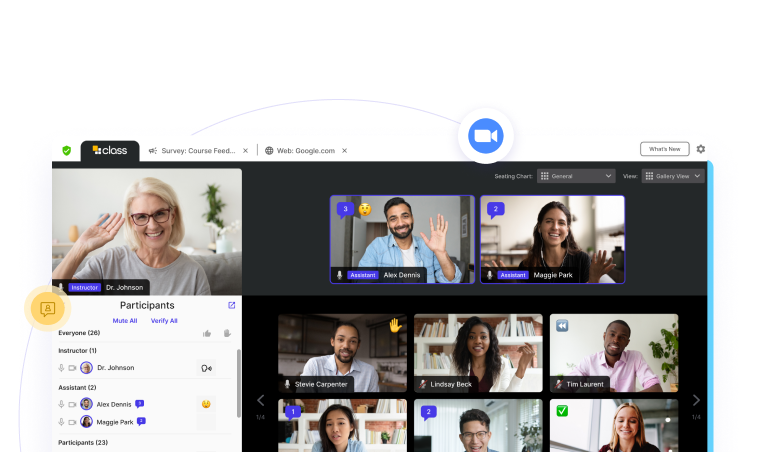
Class is the next generation virtual classroom for K-12, higher education, government agencies, and the workplace. Contact us today to schedule your live demo and see Class in action.

Class is the next generation virtual classroom for K-12, higher education, government agencies, and the workplace. Contact us today to schedule your live demo and see Class in action.

In a world that has become far more virtual – and is likely to remain so even post-pandemic – all sorts of events are being planned for the virtual environment. This includes academic conferences. But while academic event planners are adept at holding conferences in physical settings, many have had to quickly shift their approaches and adopt new practices and processes for planning an academic conference in virtual settings.
It was a shift that many navigated successfully, rising to the challenge of connecting with presenters, exhibitors, attendees, and others in a virtual environment. In August, the Professional Convention Management Association (PCMA) asked its members: “What do you consider your biggest achievement during the last six months?” By and large, “the achievement most often cited by participants was their ability to shift to virtual events—from remote classes to large conferences to international trade shows.”
With in-person gatherings no longer possible, they simply had to. Over the last several months there has been a wide range of virtual conferences appealing to audiences of all kinds. The academic world has been part of this shift, quickly pivoting to virtual to allow them to continue connecting with key audiences during the pandemic.
The National Society of High School Scholars (NSHSS) is an international honors and scholarship program co-founded by Claes Nobel, a member of the Nobel Prize family, and James Lewis. During the pandemic, NSHSS has hosted a number of events for students. Courtney Sample is the senior manager of events. Grace Panker is the manager of tours and events.
NSHSS offers a unique schedule of virtual programming throughout the year, says Panker. “Throughout 2020, we provided 60+ webinars and virtual events that covered such topics pertinent to students like up-to-date scholarship tips, college admissions COVID-related updates, and leadership development workshops.” NSHSS plans to continue virtual programming for members and parents, including college financing workshops, scholarship panels, and SAT/ACT info sessions.
So, how do go about planning an academic conference on Zoom or other digital platforms? Event planners have gleaned a number of best practices over the past several months to make their virtual conferences engaging and memorable.

Event planners share some of the best practices they have discovered and adopted during the pandemic—practices that they will continue to use even after pandemic concerns have subsided and in-person events become more the norm once again.
“Preplanning and preparation are the two most important factors,” says Sample. This is especially true, she says, when working with speakers or organizations outside of your own organization. “You want to make sure they provide you with all the assets—from marketing, to presentations, photos, etc.)—in enough time for you to build the show and market it.”
Panker agrees and also stresses the importance of rehearsal. “Unless you have done this presentation with this presenter twice or more, be sure to have a rehearsal three to seven days before the session.” In addition, she stresses the importance of testing everything. “Make sure you are familiar with every technical element you are using. Try out all of your tech beforehand.”
Even if not using Zoom for the actual event, Sample says, she would recommend using Zoom for “rehearsals, training sessions and other touchpoints with the speakers and organizations participating in the event.” Another tool she has used effectively is Jotform which is, she says, “a great tool that we use to capture exhibitor registrations, speaker information, and more.”
Sample also suggests carefully reviewing any platform you’re considering for your event to make sure it will meet your needs. And, she adds: “meet with every person involved in the event to go over how the platform works, what their role will be, and what they can do if they have any IT issues.”
Zoom, of course, tends to be a go-to platform. “It seems simple, but Zoom is the all-around best option for virtual meetings and webinars,” says Panker. “It’s affordable, accessible, and once you know the controls and settings, it’s easy to master.”
Zoom, augmented with practical capabilities designed for the educational environment made available by Class can help academic conference planners present virtual conferences that are worry-free for them, their presenters, and attendees.
While technology makes it possible to pre-record presentations and lectures and show them during the live event, that type of asynchronous presentation doesn’t engage audiences as well as live participation, says Miriam Bowers-Abbott, MA, an associate professor at Mount Carmel College of Nursing.
During the pandemic, Bower-Abbott says, many conferences shifted to a remote format but asked presenters to pre-record their presentations. “This pre-recording kills audience participation and engagement,” she says. In addition, she notes: “It precludes any sort of polling or activities during the presentation itself.”
Finally, Panker suggests, don’t feel your job is done once the conference is over. “Get creative with follow-up,” she says. “Some very effective elements we have employed are product discounts for attendees only with 24-hour expiration, links to register for upcoming virtual events, and email campaigns with strong calls to action within 24 hours.”
Even after virtual meetings begin to give way to more in-person events, lessons learned during the pandemic ensure that some level of planning an academic conference will remain in play across a wide range of professions. In fact, a poll of 900 Nature readers indicated that: “After navigating a year of online research presentations, the majority of survey respondents—74%—think that scientific meetings should continue to be virtual, or have a virtual component after the pandemic ends.” Respondents pointed to “the ease of attending from anywhere in the world as a major perk.”
Today’s technology can conveniently bring conferences from wherever they are to wherever you are.

Class is the next generation virtual classroom for K-12, higher education, government agencies, and the workplace. Contact us today to schedule your live demo and see Class in action.

Class is the next generation virtual classroom for K-12, higher education, government agencies, and the workplace. Contact us today to schedule your live demo and see Class in action.
Get our insights, tips, and best practices delivered to your inbox

Sign up for a product demo today to learn how Class’s virtual classroom powers digital transformation at your organization.

Features
Products
Integrations